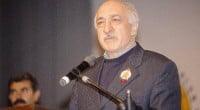Secular Pakistanis resist Turkey’s ‘authoritarian’ demands

Date posted: July 27, 2016
Turkey has asked Pakistan to crack down on institutions run by US-based cleric Fethullah Gulen, who Ankara believes was behind the failed coup against President Erdogan. But many Pakistanis do not want to follow along.
Turkey has increased pressure on its allies to act against organizations run by Fethullah Gulen, the US-based religious leader accused of masterminding the failed military coup against President Recep Tayyip Erdogan last week.
Sadik Babur Girgin, Turkey’s ambassador to Islamabad, has explicitly asked Pakistani officials to shut down such organizations in their country.
There are 28 institutions in Pakistan administered by Gulen’s PakTurk Foundation, which is also planning to open a university in the country. Operating there for decades, the Gulen movement also has business stakes in Pakistan.
“We have called on all friendly countries to prevent activities of this (Gulen’s) group,” Girgin said at a media briefing on July 23 in the Pakistani capital Islamabad. He noted that Turkey was in close contact with Pakistani authorities, adding that “we have had good cooperation with Pakistan in every field.”
A Pakistani official said the government was contemplating “various options” to deal with the issue.
“Though we haven’t received a formal request yet from Ankara (regarding the educational institutions run by the PakTurk Foundation), the deep relations with Turkey demand that we don’t look out for formalities (of written requests) and remove Ankara’s concerns on priority at all costs,” the official was quoted as saying by Pakistan’s Dawn newspaper.
A political conundrum
But experts say it won’t be easy for the authorities to shut institutions run by Gulen.
Sattar Khan, DW’s Islamabad correspondent, says the students of the PakTurk school network and the staff of the institutions administered by the organization have vowed to protest any government move against them.
“The government has not given us any notice that it plans to close down our schools. We are working as usual,” an official of the PakTurk school network told DW on the condition of anonymity.
The official also denied any direct links with Gulen. “There are many Turkish people living in Pakistan. Are they all Gulen followers?” the official questioned. “We have a staff of around 1,500 people in Pakistan, and more than 8,000 students are studying in our 22 campuses across the country.”
Tauseef Ahmed, a political analyst and former professor at Islamabad’s Federal Urdu University, believes that shutting down the Gulen-linked institutions could create political problems for Prime Minister Nawaz Sharif’s government.
“I think the government is likely to take a pragmatic approach despite its close links to Erdogan’s government. I am sure the Turkish government will understand Pakistan’s concerns. After all, the Erdogan government is also pragmatic,” Ahmed told DW.
Cricketer-turned-parliamentarian Imran Khan has also indicated that his opposition Pakistan Tehreek-e-Insaf (Movement for Justice) party would oppose the closure of PakTurk schools. Sources claim that Khan has stakes in the PakTurk foundation.
Resistance to authoritarianism
Pakistan’s proponents of secularism are angry about Ankara’s demands to crack down on Gulen institutions. They are also opposed to PM Sharif’s close ties with President Erdogan.
The Islamic country’s activists believe Erdogan is using the failed coup to impose his authoritarian rule in Turkey. They say Ankara is cracking down on dissidents, secular and Kurdish activists and journalists, and has introduced controversial terror laws – something, they say, is a bad example for Turkey’s ally Pakistan.
Some say that Pakistanis can share a thing or two with the Turkish people about their disastrous experience with Islamism.
The rise of Islamic extremism in Turkey as a result of the Syrian conflict and the way President Erdogan is using the war to silence dissent against his authoritarian rule and crush Kurdish separatists are some of the factors that are likely to shape Turkey’s future. Pakistan underwent a similar transformation in the 1980s and is still struggling to come out of it.
The Afghan war of the 1980s dramatically changed the political landscape of Pakistan. Like Ankara, Islamabad decided to become a party to the war at the behest of the West to achieve its own strategic goals – to expand its area of operation in Afghanistan to counter Indian influence.
Also, like Erdogan, former Pakistani dictator Zia ul-Haq promoted a hard-line Islamic ideology in his country and cracked down on liberal political groups and activists. He expected the West to turn a blind eye to grave human rights violations in Pakistan, as he believed he was doing a favor to the US by fighting its proxy war in Afghanistan.
Michael Kugelman, a South Asia expert at the Woodrow Wilson Center for Scholars, believes it is risky to compare Turkey with Pakistan under Zia ul-Haq, as there are many differences in their situations. But he noted that there are some striking convergences as well: “The main one is the overall volatile dynamic – a strongman-type government presiding over an environment of growing instability and terrorist threats. There is also a level of deepening Islamization in Turkey today that bears uncanny resemblances to what happened in Pakistan in the 80s,” Kugelman said.
Pakistani liberal activists say Islamabad should not encourage Erdogan by obliging his government’s unlawful and authoritarian demands. Promotion of secular and democratic values is the only way forward, they say.
Additional reporting by Sattar Khan, DW’s Islamabad correspondent.
Source: Deutsche Welle , July 26, 2016
Tags: Defamation of Hizmet | Education | Fethullah Gulen | Hizmet-inspired schools | Pakistan |
























